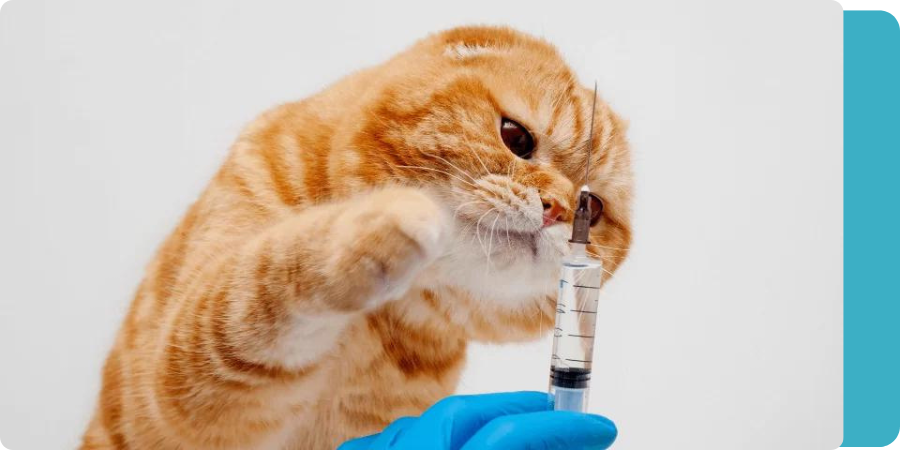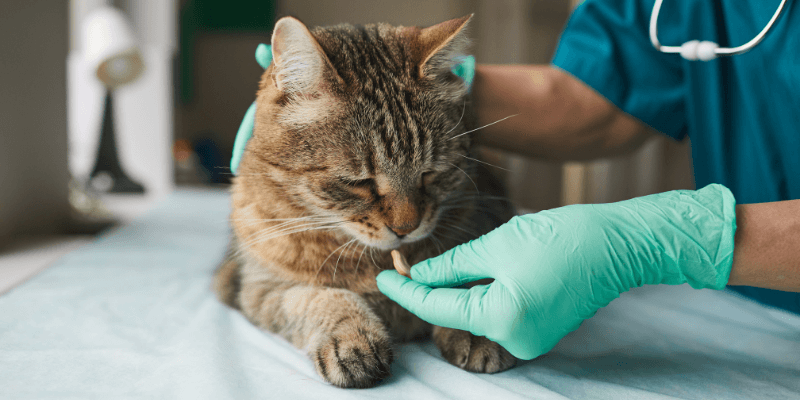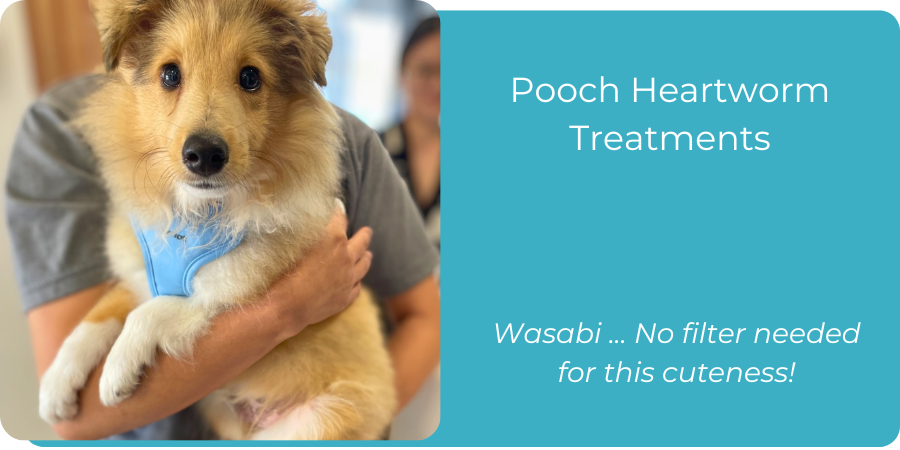Ensuring the health of your furry friends involves regular vaccinations and parasite prevention. Whether you have a kitty cat, a woofer dog, or both, staying on top of these essential tasks is key to ensuring they live long, healthy lives. This guide covers the essentials of parasite control and vaccinations for both cats and dogs, as well as tips for handling pets that may be less cooperative during these processes.
Understanding the Importance of Vaccinations
At Happy Paws, we follow the WSAVA (World Small Animal Veterinary Association) vaccination guidelines.
For Cats
Vaccinations are vital in protecting your cat against life-threatening diseases.
- All cats are recommended to be kept up-to-date with the F3 vaccination – this helps protect them against cat flu and feline panleukopaenia.
- Depending on your kitty’s lifestyle, they may also need to be vaccinated against FIV (feline immunodeficiency virus) and FeLV (feline leukaemia virus).
We recommend that every kitten receive a primary course of three F3 vaccines (from six to eight weeks of age), two to four weeks apart until they are at least 16 weeks old. All kittens with outdoor access are recommended a primary course of three FIV vaccines. Both of these injections need to be boosted annually.
For Dogs
In South East Queensland, dogs should receive a C5 vaccination to protect against parvovirus, distemper, hepatitis, bordetella and parainfluenza (canine cough).
Dogs require vaccinations to protect against several serious illnesses, and may include:
- Canine Distemper: A highly contagious and often fatal disease that affects the respiratory, gastrointestinal, and nervous systems.
- Parvovirus: A potentially deadly virus that causes severe gastrointestinal symptoms and is particularly dangerous for puppies.
- Canine Adenovirus (Hepatitis): A virus that can cause liver disease and, in severe cases, death.
-
Canine Influenza (Canine Cough): A highly contagious respiratory disease.
It is recommended that every pup receive a primary course of vaccines every two to four weeks (from six to eight weeks of age) until they are at least 16 weeks old. This is followed by their first adult vaccination one year later. From this point, they need annual vaccines with alternating components (as not every component needs to be boosted every year).

Know what pet parasite prevention you should give your four legged friend
Any cat or dog should regularly receive products to protect against ticks, fleas and intestinal worms. Dogs should also be on routine heartworm prevention, but this is optional in cats, as they are not the preferred host for heartworm, so are less susceptible.
For puppies and kittens, we recommend an intestinal all-wormer every two weeks up until 12 weeks old, and then continuing worming monthly until six months old. From this point, your pet should be wormed every three months. In rural areas where pets have access to livestock, it may be recommended to give your pet a tapeworm treatment every month in-between quarterly all-wormer doses.
Flea and tick treatments can be covered by combination products. For dogs, there are a range of effective preventative products, including a variety of chews that last between one and three months, veterinary-strength medicated collars or topical products that last up to six months. For cats, there are topical products that last up to three months.
For heartworm prevention in dogs, the gold standard is an annual injection administered by one of our vets. This can be synced up with your pet’s annual health check and vaccination. Monthly chews and tablets are available as a silver standard alternative.
As a general rule, pets should be seen for an annual vet check, where we can assess your cat or dog’s general health and discuss which vaccines are required each year to maintain their protection. At this time, we can also discuss the best options for thorough parasite prevention based on your pet’s requirements.
Parasite Control: A Year-Round Commitment
Parasite Control For Cats
Even indoor cats require regular parasite prevention. Common parasites include fleas, ticks, and intestinal worms. Regular treatments, such as monthly flea and tick prevention and quarterly deworming, are essential.
Parasite Control For Dogs
Doggies are often more exposed to parasites due to outdoor activities. In addition to fleas, ticks, and worms, dogs are at risk for heartworms, which are transmitted by mosquitoes. Heartworm prevention should be given monthly in areas where the disease is prevalent. Your dog’s parasite prevention plan should include:
- Flea and Tick Prevention: Monthly treatments are recommended, especially during warmer months when these parasites are most active.
- Heartworm Prevention: Regular administration of heartworm preventatives is crucial, particularly in regions where mosquitoes are common.
- Deworming: Dogs should be dewormed regularly, as intestinal worms can be contracted from various sources, including contaminated soil or faeces.
Heartworm and Your Pooch
No owner ever expects their beloved pooch to catch deadly heartworm but did you know this disease occurs throughout Australia (particularly prominent in Queensland) and is a problem year-round? A single bite from a mosquito is all it takes to spread this potentially fatal disease. You’ve all heard the saying: “prevention is better than cure”.
When it comes to heartworm this couldn’t be more true. In fact, it’s because heartworm is so difficult and expensive to treat that we recommend continuous 12-month protection for all our doggos. Sadly a great percentage of heartworm positive dogs who receive the treatment still don’t make it. Make sure you don’t put your pooch at risk!
If you are overdue in your doggo’s heartworm treatment or have never treated, call us to book an appointment so we can chat through some options about continuous 12-month protection to ensure your baby is protected ![]()
How To Handle Less Cooperative Pets
Administering vaccinations and parasite prevention can be challenging, especially with pets that are anxious or resistant. Here are some tips for managing this process:
Cat Vaccination and parasite control routines for ‘less than cooperative’ kitties
Whilst our domesticated feline friends may like to think of themselves as little wild jungle cats, they still require our assistance to stay healthy, starting with the protection of a regular cat vaccination and parasite control program. Here’s how you can practically achieve optimal protection for your resident feline, even if they are acting a bit like a jungle cat!
- Gentle Restraint: Wrapping your cat in a towel can help keep them calm and prevent them from scratching during treatments.
- Calming Aids: Products like Feliway can help reduce stress, making your cat more receptive to treatment.
- Positive Reinforcement: Rewarding your cat with treats or playtime after treatment can help them associate the experience with something positive.
- Veterinary Assistance: If your cat is particularly difficult or anxious, seek help from your vet who can dispense prescription medication to help ease their stress.

TIP – Choosing the Right Carrier To Bring Your Kitty To Happy Paws
Avoid backpack carriers and flimsy fabric carriers as these can be tricky to clean and give the sensation of collapse. Being visually exposed, having restricted space, limited ventilation as well as being in an unsteady or unstable environment will cause unnecessary distress for your feline friend. Our recommendation is for a sturdy, plastic carrier that can be easily cleaned with a front and top opening.
A removable top half of the carrier with quick release clips will allow your cat to remain in the bottom half, feeling safe during any interactions or examination.
Your carrier should also have a secure door to prevent escape and slats on each side for ventilation ….. and treat delivery. 😺
In a purrrrfect world, your cat should enter their carrier voluntarily, perhaps with some encouragement in the form of treat or toy, or through being trained to do so. Just as Dr Felicity’s little Walter is being trained to do here! We will provide some tips on how to do this soon!
For Woofers
- Training and Desensitisation: Gradually getting your dog accustomed to the sights and sounds of treatment can make the process less stressful.
- Distraction Techniques: Using treats, toys, or even gentle praise during treatment can keep your dog focused on something positive.
- Muzzle Training: For dogs that are particularly resistant or prone to snapping, a well-fitted muzzle can ensure safety during treatments.
- Veterinary Support: For particularly challenging dogs, professional help from your vet or a trained technician can make a significant difference.
The Role of Regular Veterinary Check-Ups
Whether you have a cat or a dog, regular veterinary check-ups are essential for maintaining their health. These visits ensure your pets are up-to-date on vaccinations and parasite prevention and allow your vet to catch any potential health issues early. Additionally, your friendly Happy Paws vet can provide guidance on the best products and techniques for managing your pet’s health at home.
Conclusion: A Lifelong Commitment to Health
Keeping your pets protected from diseases and parasites is a lifelong commitment that requires regular vaccinations, consistent parasite prevention, and routine vet visits. While these tasks can sometimes be challenging, particularly with less cooperative pets, they are vital for ensuring your pets enjoy a long, healthy life. With the right approach and support from your veterinarian, you can make these processes smoother and less stressful for both you and your pets.
If you’re unsure whether your pet is properly protected, seek advice from our friendly team!
































